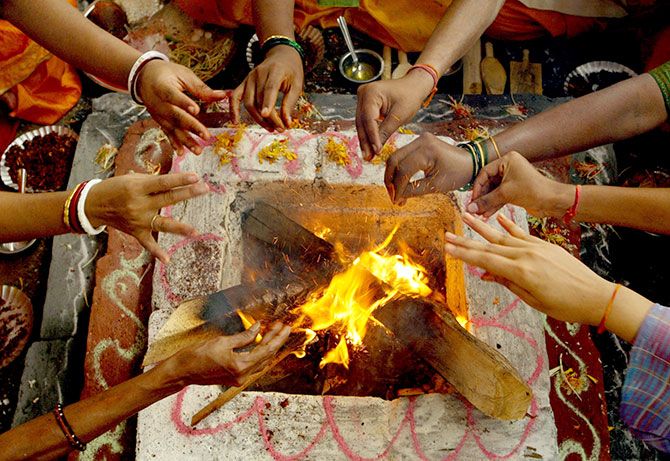The Devta in mythology can be your vendors, investors or shareholders, says Pardeep Goyal.

What is business? Isn't it an exchange of valuable things?
I give you something in which you perceive some value, and in exchange, you will give me something of equal value.
I was reading the book Business Sutra by Devdutt Pattanaik.
In it, he relates myths and rituals to modern-day business practices.
In this article, I will share what I understood from one of the stories.
In the ancient times, Indians used to do Yagnas (rituals) to please Devtas (gods).
"The yajaman initiates this ritual, makes offerings into agni (fire burning in the altar), exclaiming, "svaha" ("this of me I offer"), hoping to please his chosen deity or devta, who will then hopefully give him whatever he desires, exclaiming "tathastu" ("so it shall be")," the book's opening chapter explains.
What I understood was that in the modern-day context, a business is agni-kunth where the founder burns his money, time and energies.
These tangible and intangible things will never come back once spent, so it's 'swaha' -- to the ashes.
In a yagna, the yajaman expects that the Devta will come if he will be able to make the Devta happy with his offerings.
The Devta will then give him vardaan, uttering the word 'tathastu'.
In business, the Devta represents the customers who are happy with your product/service and willing to pay a price -- the 'vardaan' -- the value in exchange.
In different contexts, the Devta can also be your vendors, investors or shareholders, who exchange value with you.
If you make them happy, they will make you happy.
You might have heard stories in which a person asks for a 'vardaan' that Devta is not entitled to grant.
In that case, the Devta provides alternative options to choose from.
This is like business negotiation in modern-day business.
What we can learn from ancient science of Yagna that we can apply to our business?
Sunk Cost
Ahutis once burnt will not come back.
That's why uttering the word 'swaha' is important; it means 'burnt to ashes'.
Similarly, money once spent on business will not come back – it's 'swaha'. MBAs call this 'sunk cost'.
We should forget about sunk cost and focus on opportunities in the present.
In my first start-up, we spent a lot of money in the initial few months.
Later, we were left only with small money, and then understood that there was no way to recover our costs.
We looked ahead, and shut down the business so that we could utilise our remaining money in a better business.
ROI (Return on Investment)
Vardaan is akin to return over investment.
It's like the money given by customers/investors, but it comes after you have spent money and effort on providing value to your Devta.
No yagna happens without expecting 'tathastu'.
Money and other resources are spent on building businesses in the expectation of returns (short term and long term).
First you invest, and then you expect returns.
Sales Pitch
The Yajman takes care of the Devta by offering him 'ahutis' and reciting shlokas and mantras that please him.
They communicate the right message to him by carefully choosing the right mantras, and uttering them in a certain way, along with throwing offerings into the fire.
Businesses should focus on the customer, with the right product and right sales pitch.
The product alone will not give you success.
You should be able to communicate to your customer how this product can help them succeed.
You should be a master in communicating the right message in the right tone to the right persons.
That's why you should have different pitch decks for your customers, investors and partners.
Winning over customers is not enough; you have to provide good customer service to keep them happy.
Right Expectations
Asking for 'eternal life' from a Devta is asking too much, no Devta ever gave this Vardaan to anyone.
It's important to set the right expectations with the customer.
It's not good for your business to ask too much or too less from your customers.
Set your price such that the customer is willing to pay happily.
I'm sure you have enjoyed reading about mythology in a business context.
I would love to hear from you about any other similar interesting books you may have read recently.
Lead image used for representational purposes only. Image: Arko Datta/Reuters










